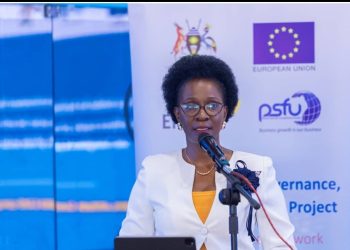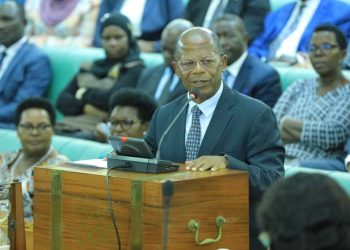President Yoweri Museveni has directed the State Minister for Transport, Aggrey Bagiire, to organize elections for the leadership of taxi operators across the country. Museveni has also proposed that elections of the governing body of the taxi sector in the country be held on the basis of
“A taxi being the elective constituency, represented by one driver and one conductor.”
The President, according to officials from the works ministry, also wants the Transport Licensing Board to organize the taxi industry by registering all the taxis, design a route chart for them, organize the taxi operators, drivers and conductors in a unifying association and ensure that the said association has proper and accountable leaders elected democratically by drivers and conductors.
To roll out the guidelines for the elections, the works ministry, early this year, dispatched teams throughout the country to establish the number of stages and the structure of taxi operators. According to Suzan Kataike, the spokesperson of the works ministry, the team has finalized the countrywide taxi operation study and will come out with a report next month.
“The team is working on the report to streamline the election guidelines,” she said yesterday in a telephone interview.
Taxi report
On January 17, the team from the works ministry also met heads of taxi associations in the country at Hotel Africana, in Kampala to deliberate on Museveni’s proposal for election of their governing bodies and the electoral guidelines.
According to a report presented to taxi operators by Robert Kisakye, the taxi licensing officer at the ministry, during the meeting, majority of taxi operators welcomed Museveni’s proposal for elections, which are slated for March this year.
Their only contention, Kisakye added in his report, is who will be elected to the taxi operators’ governing body, how many representatives and the mapping out of the routes for each region.
“Whereas the benefits of the route charts in terms of reducing wasteful competition, prevention of crime and organisation were appreciated, many of the operators felt that the restrictions introduced by the Government would curtail the movement of town service vehicles. They proposed that it should be restricted to long distance vehicles,” Kisakye said.
In his directive to Bagiire, the President proposed that all taxis should remain on their licensed routes for a year and that the taxi operators should use route charts provided by the ministry. However, taxi operators have pointed at some loopholes in the election guidelines, although they agree with Museveni’s proposal that elections should be held.
Proposed amendments
Mustafa Mayambala, the chairperson of the Uganda Transport Development Agency (UTRADA), a conglomeration of taxi operators in Kampala, said there must be amendments to the proposed electoral guidelines.
“We request that all qualified drivers and conductors be allowed to vote their leaders at all levels, from the stage to apex leadership by adult suffrage as was directed by the president, but not electoral colleges. We also request that voting is done by ballot boxes to enable drivers and conductors participate in the voting exercise without disrupting the transport services,” he said.
Taxi operators also argue that about 30% of qualified taxi drivers with genuine driving licences are registered on stage chart lists, but do not own or drive taxis at any given time. According to the electoral guidelines proposed by the ministry, these (30% qualified taxi drivers) will not be allowed to vote, a move that the taxi operators have protested.
“We also heard that Kampala city will be divided into five districts where each division shall be registered as a district, level status. If this system is used, it shall deny Kampala city taxi operators their own apex leadership committee at a district level,” Mayambala said, emphasising that Kampala forms 80% of the taxi industry business in the country.
The taxi operators have also proposed that positions such as welfare secretary, mobiliser and representatives for taxi owners, women, special interest groups and passengers be introduced in the electoral tally of leaders at the taxi governing executive. According to the proposed electoral guidelines by the works ministry, the qualification guideline is that a taxi driver and conductor must be working in the taxi industry at a particular stage/park of operation.
Levies and fees
Following unending clashes between taxi operators and local government authorities over ‘unfriendly’ monthly levies, on July 22, last year, Museveni wrote to the Prime Minister, Dr Ruhakana Ruganda, directing that government agencies should not overtax informal sector players.
Museveni said informal groups such as market traders, banana traders, gonja and muchomo vendors and taxi operators should not be taxed on a monthly basis, but rather such levies should be aggregated into an annual levy.
Following Museveni’s pronouncement, taxi operators halted payment of monthly levies, especially the sh120,000 KCCA road user fee, prompting meetings between taxi operators and local government officials over the matter. A report on the agreed position over levies is not yet out, but the taxi operators are still paying the KCCA monthly road user fee, despite Museveni’s directive that the fee be paid annually. It is, however, still unclear under what legal framework the elections for taxi operators will be held.
Currently, there are hundreds of taxi organisations across the country, some registered as Savings and Credit Co-operative Societies (SACCOS) or as limited liability companies. Many taxi stages have established autonomous SACCOS






























































